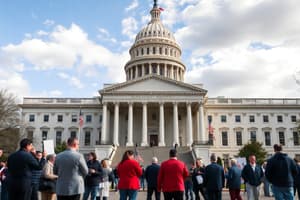Podcast
Questions and Answers
What does comparative politics primarily analyze?
What does comparative politics primarily analyze?
- Interactions between global non-state actors
- Similarities and differences between political systems (correct)
- Management practices in public agencies
- Fundamental political ideas and concepts
Which subfield focuses on the implementation of government policy?
Which subfield focuses on the implementation of government policy?
- Public Policy
- International Relations
- Public Administration (correct)
- Comparative Politics
Which term describes a political system where power is vested in the people?
Which term describes a political system where power is vested in the people?
- Democracy (correct)
- Monarchy
- Oligarchy
- Authoritarianism
What does the study of environmental politics primarily address?
What does the study of environmental politics primarily address?
Which of the following best characterizes political theory?
Which of the following best characterizes political theory?
Which analysis method combines qualitative and quantitative approaches?
Which analysis method combines qualitative and quantitative approaches?
What does globalization refer to in the context of political science?
What does globalization refer to in the context of political science?
In political science, which of the following best describes authority?
In political science, which of the following best describes authority?
Flashcards are hidden until you start studying
Study Notes
Definition
- Political science is the systematic study of political institutions, processes, behavior, and power dynamics within societies.
Subfields
-
Comparative Politics
- Analyzes different political systems and their functions.
- Studies the similarities and differences between countries.
-
International Relations
- Examines interactions between states and non-state actors.
- Focuses on issues like conflict, diplomacy, and global governance.
-
Political Theory
- Explores fundamental political ideas and concepts (e.g., justice, power, rights).
- Engages with historical and contemporary political philosophers.
-
Public Administration
- Studies the implementation of government policy.
- Focuses on management practices in public agencies.
-
Public Policy
- Analyzes the formulation, implementation, and evaluation of policies.
- Examines the role of government in addressing societal issues.
Key Concepts
-
Power
- The ability to influence or control behavior and outcomes.
-
Authority
- Legitimate power recognized by individuals or groups.
-
State
- A political entity with a defined territory, population, government, and sovereignty.
-
Democracy
- A system where power is vested in the people, who elect representatives.
-
Political Ideologies
- Frameworks of ideas (e.g., liberalism, conservatism, socialism) that shape political beliefs and practices.
Methodologies
-
Qualitative Analysis
- Involves non-numerical data to understand political phenomena (e.g., interviews, case studies).
-
Quantitative Analysis
- Utilizes statistical methods to analyze political data (e.g., surveys, experiments).
-
Mixed Methods
- Combines qualitative and quantitative approaches for comprehensive analysis.
Current Trends
-
Globalization
- Increasing interdependence of states and societies worldwide.
-
Populism
- Political movements that appeal to the interests and concerns of the average person.
-
Environmental Politics
- Focus on policy responses to environmental issues and climate change.
-
Technology and Politics
- Impact of social media and digital platforms on political engagement and activism.
Career Opportunities
-
Academia
- Teaching and research positions at universities.
-
Government
- Roles in public service, policy analysis, and administration.
-
Non-Governmental Organizations (NGOs)
- Advocacy, research, and implementation of social change initiatives.
-
International Organizations
- Work with bodies like the UN or EU on global political issues.
-
Think Tanks
- Research and policy development in various political areas.
Definition
- Political science systematically studies political institutions, processes, behavior, and power dynamics within societies.
Subfields
-
Comparative Politics
- Analyzes and compares different political systems, evaluating similarities and differences between countries.
-
International Relations
- Focuses on the interactions among states and non-state actors, addressing issues such as conflict, diplomacy, and global governance.
-
Political Theory
- Explores fundamental concepts like justice, power, and rights, engaging with both historical and contemporary political philosophers.
-
Public Administration
- Concentrates on how government policy is implemented and examines management practices in public agencies.
-
Public Policy
- Analyzes the full cycle of policy formulation, implementation, and evaluation, and its role in tackling societal issues.
Key Concepts
-
Power
- The capacity to influence or control behavior and outcomes, categorized as either legitimate or coercive.
-
Authority
- A form of legitimate power recognized by individuals or groups, essential for governance.
-
State
- A defined political entity characterized by territory, population, government, and sovereignty, serving as a principal actor in political science.
-
Democracy
- A system of governance where power resides with the people, typically exercised through the election of representatives.
-
Political Ideologies
- Sets of beliefs and frameworks (e.g., liberalism, conservatism, socialism) that guide political behavior and policies.
Methodologies
-
Qualitative Analysis
- Employs non-numerical data, such as interviews and case studies, to gain insights into political phenomena.
-
Quantitative Analysis
- Utilizes statistical methods, including surveys and experiments, to examine political data and test hypotheses.
-
Mixed Methods
- A hybrid approach that combines qualitative and quantitative techniques for a comprehensive understanding of political issues.
Current Trends
-
Globalization
- Reflects the growing interconnectedness and interdependence of states and societies across the globe.
-
Populism
- Political movements that leverage the interests and concerns of the average person against established elites.
-
Environmental Politics
- Focuses on policies addressing environmental challenges and responses to climate change.
-
Technology and Politics
- Investigates the influence of social media and digital platforms on political engagement, activism, and movements.
Career Opportunities
-
Academia
- Involves teaching and conducting research at higher education institutions.
-
Government
- Opportunities in public service, policy analysis, and administrative roles within government agencies.
-
Non-Governmental Organizations (NGOs)
- Focus on advocacy, research, and implementing initiatives for social change.
-
International Organizations
- Work with entities like the United Nations (UN) or European Union (EU) on global political issues.
-
Think Tanks
- Engage in research and policy development, providing analysis and recommendations on various political matters.
Studying That Suits You
Use AI to generate personalized quizzes and flashcards to suit your learning preferences.




